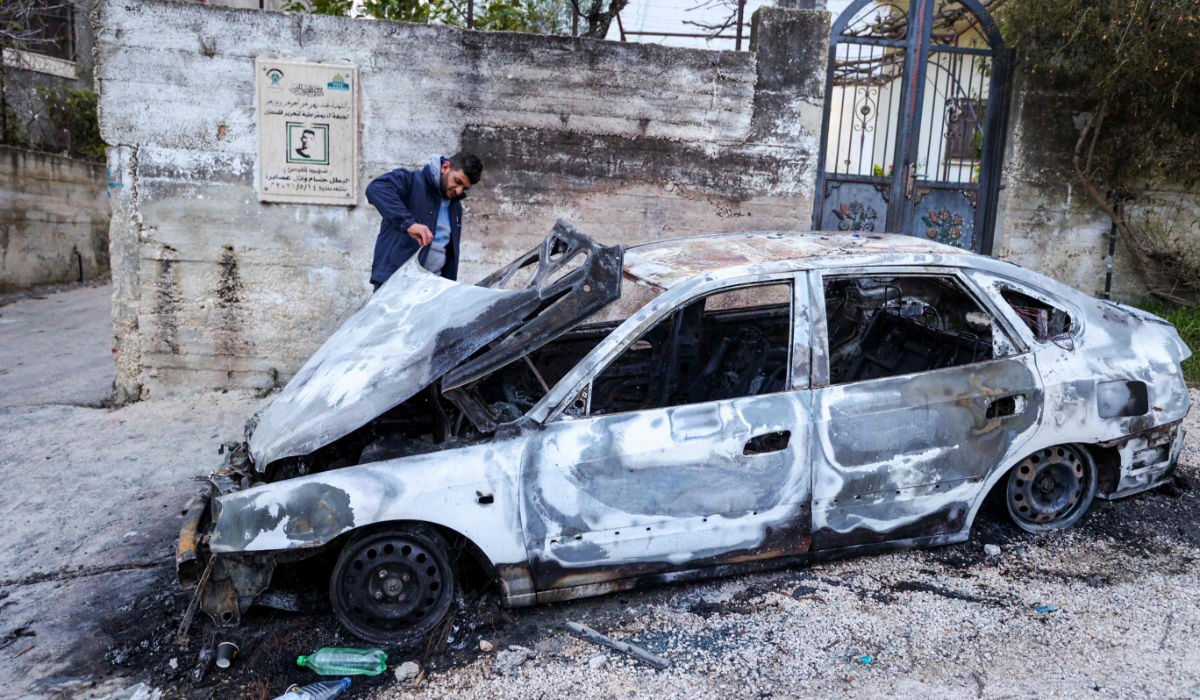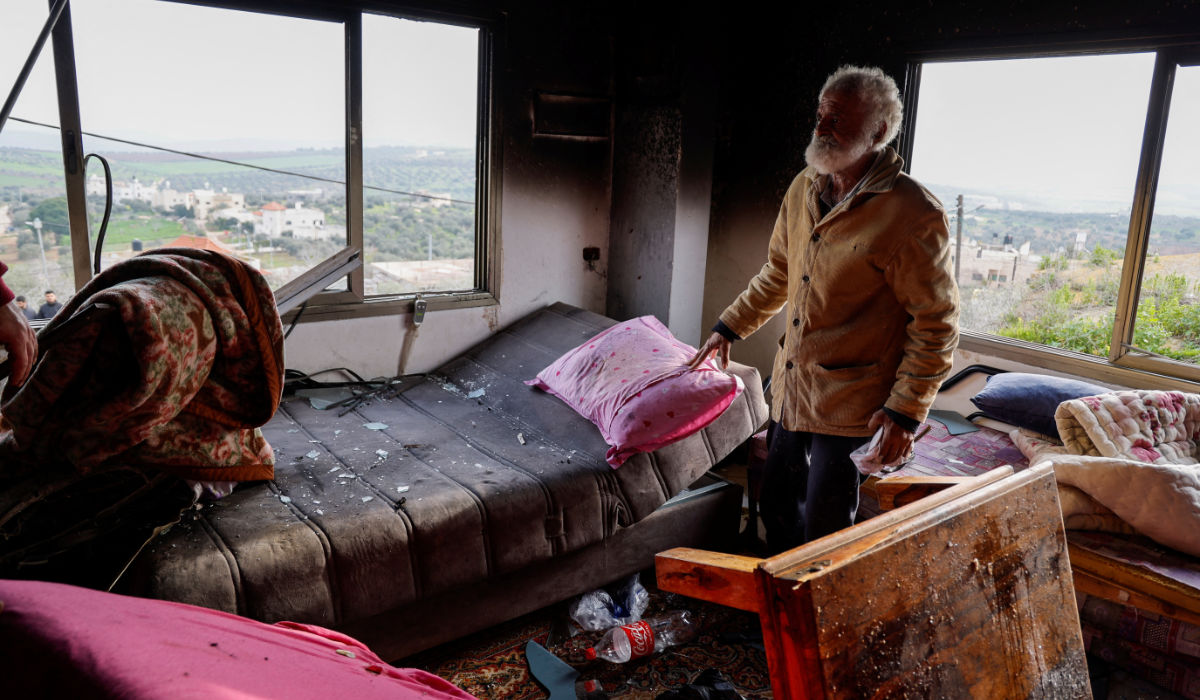KIRYAT ARBA, Palestinian Territories: Israeli settler Ely Federman probably doesn’t know it yet, but he is under international sanction.
While he is at war for Israel in Gaza, Britain has frozen his assets in the United Kingdom as part of a rare move targeting violent Israeli settlers.
On Monday Britain announced the sanctions, which include travel and visa bans, against Federman and three other “extremist Israeli settlers” accused of human rights abuses against Palestinians.
The United Kingdom’s foreign ministry said Federman had been involved in “multiple incidents” against Palestinian shepherds in the South Hebron Hills of the Israeli-occupied West Bank.

A Palestinian man inspects a car damaged during a raid by Israeli security forces looking for wanted militants in the village of Sir, south of Jenin, in the occupied West Bank on February 13, 2024. (AFP)
Federman is a name well known among the radical right linked to attacks on Palestinians. Noam Federman, Ely’s father, is a central figure on Israel’s extreme right who has been imprisoned several times.
Ely “knows nothing” about the sanctions. “He has no telephone” while he is in Gaza, Noam Federman told AFP at the settlement of Kyriat Arba, where he lives on the edge of Hebron.
“He’s driving vehicles that clear the terrain for tanks,” said Federman, who has a salt and pepper beard and wears a braided kippa.
He said he wasn’t surprised by Britain’s action.
“There has for several years been a campaign by anarchists and leftists against the ‘people of the hills’,” his term for the extremists.

A Palestinian looks at the damage of a house from an Israeli raid near Jenin, in the Israeli-occupied West Bank, February 13, 2024. (REUTERS)
Around 490,000 Israelis live in dozens of West Bank settlements that are deemed illegal under international law. They live alongside around three million Palestinians in the territory.
Palestinians view Israeli settlements as a war crime and a major obstacle to peace, but many national-religious hard-liners see living there as fulfilling a divine promise.
Israel captured the West Bank, along with the Gaza Strip and east Jerusalem, in the 1967 Arab-Israeli war.
Since the attack by Hamas militants against Israel triggered the war on October 7, Palestinians have accused Western governments of not putting enough pressure on Israel to prevent civilian deaths from its retaliatory bombardment of Gaza.
Noam Federman sees the Western sanctions, then, as an attempt to show a “balanced” position toward Israel.
The British move came after Washington on February 1 sanctioned four Israeli settlers for violence against West Bank civilians, and France on Tuesday imposed penalties against 28.
Israeli settlers killed at least 10 Palestinians and torched dozens of homes in the occupied West Bank in 2023, making it the “most violent” year on record for settler attacks, according to the Israeli human rights group Yesh Din.
Among those targeted by both Britain and the United States is the son-in-law of Noam Federman, Yinon Levy.
They accused him of leading settlers from the unauthorized outpost of Meitarim Farm who have assaulted Palestinian and Bedouin civilians, burned their fields and destroyed their property.
Levy founded the wildcat settlement in 2021, at the southernmost point of the West Bank.
He lives there with his wife Sapir, three horses, around 200 lambs, and security cameras that emit a powerful “bip bip” sounds when strangers near.
Local media suspect Levy of links to the dismantlement of Khirbet Zanuta, a Palestinian village a few hundred meters (yards) away.
Khirbet Zanuta falls within what is known as Area C, the part of the West Bank under complete Israeli control. The village has received numerous official demolition orders in the past.
Finally an unknown group took apart the village and its makeshift homes at the end of October.
“The settlers made life very hard for us,” said Fayez Al-Til, head of the local council. Til welcomed Western sanctions against the settlers.
The Israeli watchdog group Peace Now on Thursday said Israeli settlers established a record number of 26 wildcat outposts — settlements not officially approved — in the occupied West Bank last year.
Peace Now said that figure includes around 10 since war in the Gaza Strip broke out on October 7.
Such outposts sometimes begin with a simple mobile home, and expand as other settlers move to the area.
Settler violence against Palestinians has increased since the war started.
Under the sanctions, the accounts of Levy and his wife have been frozen, since the bank has a branch in the United States and is part of the global financial messaging service, SWIFT.
The Israeli parliament’s economic affairs committee on Wednesday held an urgent meeting about Levy.
David Bitan, the committee head and a member of Prime Minister Benjamin Netanyahu’s Likud Party, said the government has to act “otherwise it won’t stop.”
Levy and his wife can no longer use their bank cards, but they have received donations “not only from settlers but from all Israel,” Noam Federman said, denouncing the “robbery” perpetrated against them through the sanctions.
He foresees the same problem for his son Ely, at war in Gaza.
“What is going to happen when his salary has to be paid in a frozen bank account?” Federman asked. “He’s a soldier. This will be very embarrassing, I think, for the Israeli army.”














